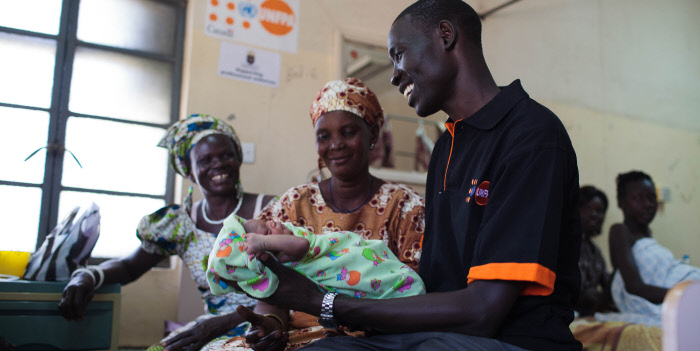An overview of how the Swedish International Development and Cooperation Agency (Sida) is adapting Swedish aid in response to the ongoing pandemic.
Text by Emma Nordstrand, intern at Sida, Department for Africa, Unit for Justice and Peace.
Global challenges require a global response. As the covid-19 pandemic spreads to the most vulnerable populations, Sweden is rearranging its foreign aid to meet new demands. The societal implications of the virus are significant, making the reallocation of resources critical, domestically as well as to aid those abroad who are facing even more urgent struggles. This is a crucial aspect, both in the fight against the virus and in preparation for challenges to come.
“Developing countries are especially vulnerable to the crisis”
All over the world, drastic measures are taken to flatten the curve of the number of infected people – restaurants, schools, and borders are closing; many are confined to isolation in their house. As a result, people lose their jobs, children lose their right to education and the human right to freedom is infringed upon. It goes without saying that the pandemic is a health crisis, but mitigation measures also contribute to economic and social insecurity. Covid-19 will undoubtedly have colossal and far-reaching consequences, affecting us all in one way or another.
While consequences are global, developing countries are especially vulnerable to the crisis. They often have weak healthcare systems with few resources and to which there is limited access. In Ethiopia for example, the number of hospital beds per 1000 people is 0,3, compared to 4,4 in Finland. Moreover, some countries simultaneously face other challenges, which further increases their vulnerability. Ravaging conflicts, diseases like HIV and malaria, democratic backsliding, and the locust invasion in East Africa are all examples of hardships that Covid-19 adds to. Poverty in particular leads to increases in vulnerability both to the virus and consequences of state measures. In villages far from healthcare facilities or in slums and refugee camps where people have limited space and insufficient access to water and sanitation, risks of transmission are severely aggravated. The precarity of being dependent on daily work to get sufficient food also becomes more apparent as these countries are reached by the pandemic.
All of this represents a tremendous threat to the attainment of Agenda 2030 and the Sustainable Development Goals (SDG). In fact, recent estimates suggest that any progress made in the accomplishment of the goals could be undone or even reversed; poverty rates could go back to where they were in the 1990s, several decades before said goals were established.
Sweden chooses solidarity
Despite the evident need to take action, and despite the fact that 193 countries have committed to reaching the goals, the response trend does not appear to be cooperation and solidarity. Reports of canceled shipments of medical protective equipment to countries in need – even stolen deliveries – have been widespread in the news. Focusing resources on fighting the outbreak in the U.S., President Trump said he will stop funding the World Health Organization (WHO), whereas in Sweden, the debate about trimming down foreign aid had been ongoing even before the spread of Covid-19.
However, Sweden has now decided to step up by increasing its funding to the WHO and contributing to the United Nations’ appeal for funding. Yet, a large part of the country’s contribution to the response, as well as to Agenda 2030, is channeled through Sweden’s Development Cooperation Agency (Sida). The agency partners with local and international actors like UN Agencies and governments to enhance democracy and ensure adherence to human rights. Sida functions as a donor, while the various partners work on the implementation of their respective projects at all different levels: local, regional and global. The agency prioritizes the most vulnerable, thereby demonstrating their commitment to the SDG principle of “leaving no one behind”.
How Sida supports developing countries facing the pandemic
The pandemic seems to have in many ways decreased productivity and caused society to slow down, while Sida in particular has had to adapt and intensify its work. It has reached out to its partners to investigate the question of whether they can still conclude ongoing interventions, reallocate investments or instigate new initiatives in response to the pandemic. Resources have already been strengthened and efforts adapted to allow rapid mitigation of negative impacts and enhance resilience. Moreover, Sida uses information campaigns to increase awareness of the virus and how to stem the spread. In Burkina Faso, the support provided to independent media has been adjusted to enable radio shows about covid-19 in four different languages. The agency also enables continued education through digital solutions. In Tanzania, this is done partly through radio, while an Afghanistani solution includes teacher support.
In a more logistical sense, Sida’s aid helps to provide valuable resources to vulnerable people and communities – in Kenya, washing stations are installed to secure access for people with disabilities; in Bangladesh, soaps and masks are distributed, along with information about the virus. Sida also provides assistance to businesses and markets in their mitigation efforts – in Asia, for instance, it has teamed up with H&M to create a fund to mitigate the pandemic’s effects on the textile industry. In Ethiopia, textile companies have been assisted in redirecting their work to start creating protective masks.
In the process of targeting direct consequences and building up resilience, Sida and its partners work to ensure that vital rights and needs are not forgotten or repressed. For example, they continue to ensure access to Sexual and Reproductive Health and Rights (SRHR) in Africa, rights that are otherwise often ignored in times of crisis. To safeguard against unnecessary infringements on human rights, Sida supports efforts to document violations, protect journalists, and spread accurate information. In Iraq, support to the government has been readjusted to ensure its continued functionality throughout the crisis by investments in digitalization.
In demanding situations like these where large portions of the world’s population are brought to their knees and many countries turn inwards, it is encouraging to see that efforts are continually made and that solidarity by means of aid remains. After all, global challenges do, as stated, require a global response. As the world is increasingly interlinked, one country’s difficulties more or less become all countries’ problems, whether we like it or not. If developing countries are unable to defeat the virus, it will remain a threat to the rest of the world, too. Lost or declining progress towards the achievement of the Sustainable Development Goals threatens the future of all mankind. As we fight this pandemic, we need to do it together. While a globally coordinated response will be extremely challenging and perhaps intangible, Sida could serve as an example and show us where to begin.





